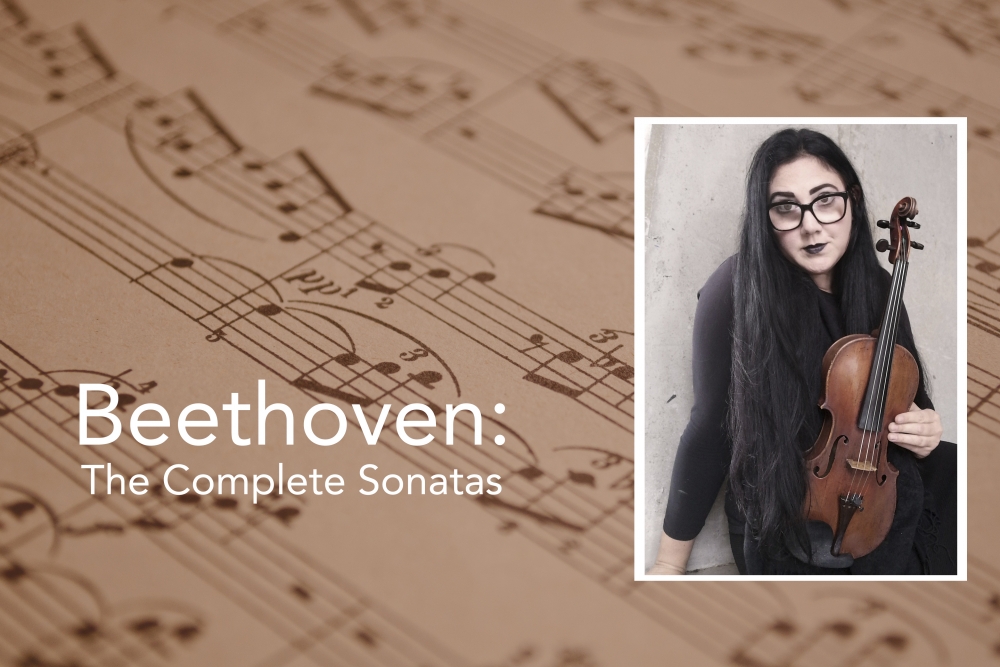
Sonatas and Scholarship
Classical music is sometimes marketed as an escape. Alexandra Birch knows better. While a symphony or sonata can be a highly personal distillation of deeply felt emotions, it also serves as a reflection of the society and era in which it was created.
This sort of mirroring can be disturbing, as the violinist and UC Santa Barbara doctoral student knows all too well. Her scholarship explores the use of music by the Nazi regime, and includes rediscovering works by composers who were murdered in the Holocaust.
But music can also bring to life Enlightenment-era ideals of knowledge, freedom and liberation — concepts worth reaffirming, and celebrating, in these fraught times. No composer expressed them better than Beethoven, whom Birch will honor next week by performing all of his Violin Sonatas at Santa Barbara’s Congregation B’nai B’rith.
“About 100 years ago, with the rise of the Third Reich in Germany, Jews were banned from playing Beethoven in public spaces,” she said in an interview. “So for me, it’s very poignant to be able to return to a Jewish space in our Santa Barbara community and play the 10 sonatas.”
The Beethoven cycle, which begins at 2 p.m. Sunday April 24 and continues at 7 p.m. the following two evenings, will feature seven different pianists, including five UC Santa Barbara colleagues. In addition, Birch has recorded a lecture-demonstration focusing on the best-known of the group, the Kreutzer Sonata, which can be viewed on YouTube.
“We don’t want to play the sonatas at people, but rather immerse ourselves in the community,” she said. The three concerts will all be free, thanks in part to funding from the Interdisciplinary Humanities Center at UC Santa Barbara.
Birch, who happily splits her time between dusty archives and concert stages, has given two solo recitals at New York’s legendary Carnegie Hall — both the result of winning competitions. During her junior high and high school years, she regularly flew to New York from her Arizona home to take violin lessons at the prestigious Juilliard School.
While she ultimately earned three degrees in performance from Arizona State University, and still plays concerts regularly, she decided against pursuing a full-time career as a musician. “I wanted to find my own niche,” she said. She gradually started focusing her attention on the Holocaust, the study of which proved an excellent fit for her language skills (she speaks both Russian and German).
“I had a very clear pivot point,” she said. “In the summer of 2015, I was an Auschwitz Jewish Center Fellow. I was touring the death camps in Poland with a group of academics. We were doing research and taking testimonies from survivors, and from people who had hid people from the Nazis.
“At that point, I saw Holocaust research and music performance as pretty disparate fields,” she continued. “The following week, I was in Germany playing Beethoven and Brahms, and I wasn’t thinking about my research in Poland.
“Then, on my way to a rehearsal, I quite literally tripped over what is called a ‘tripping stone.’ They have them all over Germany. They are little gold bricks that are placed in the ground by German municipalities — tiny memorials of three people who died at Auschwitz, or another death camp. They’re typically placed in front of what had been people’s homes or businesses.
“That was a real point of reckoning. It led me to ask how we can advocate for composers who were murdered, and whose voices are no longer heard in classical music.”
Three years later, as a fellow with the U.S. Holocaust Memorial Museum, Birch “found hundreds of scores in the old Soviet archives,” she said. “I performed and recorded 10 or 12 I found particularly compelling. Most were by composers who were murdered in the Holocaust — not in camps, but in mass shootings in the USSR. Most were Jewish, but not all.”
It sounds like grim work, but Birch doesn’t see it that way. “I find music an engaging way to talk about a difficult subject,” she said. “Rather than looking at the person (who was murdered in the Holocaust) as a victim, you can see them as someone who contributed something to the world.”
The horror of mass killings is back in the news today, thanks to the brutal Russian invasion of Ukraine. Birch, who has performed in such Ukranian cities as Kyiv and Lviv, recently organized a benefit concert at a Ukranian church in Goleta, which raised more than $2,000 for humanitarian relief.
Birch, who is currently writing a book on how the Third Reich used music as a tool during its campaigns of war and genocide, arrived at UC Santa Barbara in 2020 to work towards a Ph.D. in musicology. She subsequently moved to the history department, where she expects to complete her doctorate in two years.
Where does she go from there? “Hopefully, the U.S. Department of State,” she said. “I want to do public diplomacy in the former Soviet Union. I’m hoping performing will be an important part of that.”
……….
Alexandra Birch will perform the complete Beethoven Violin Sonatas, in chronological order, at 2 p.m. April 24, 7 p.m April 25, and 7 p.m. April 26 at Congregation B’nai B’rith, 1000 San Antonio Creek Road in Santa Barbara. Admission is free. More information: https://www.ihc.ucsb.edu/event/beethoven-birch/



